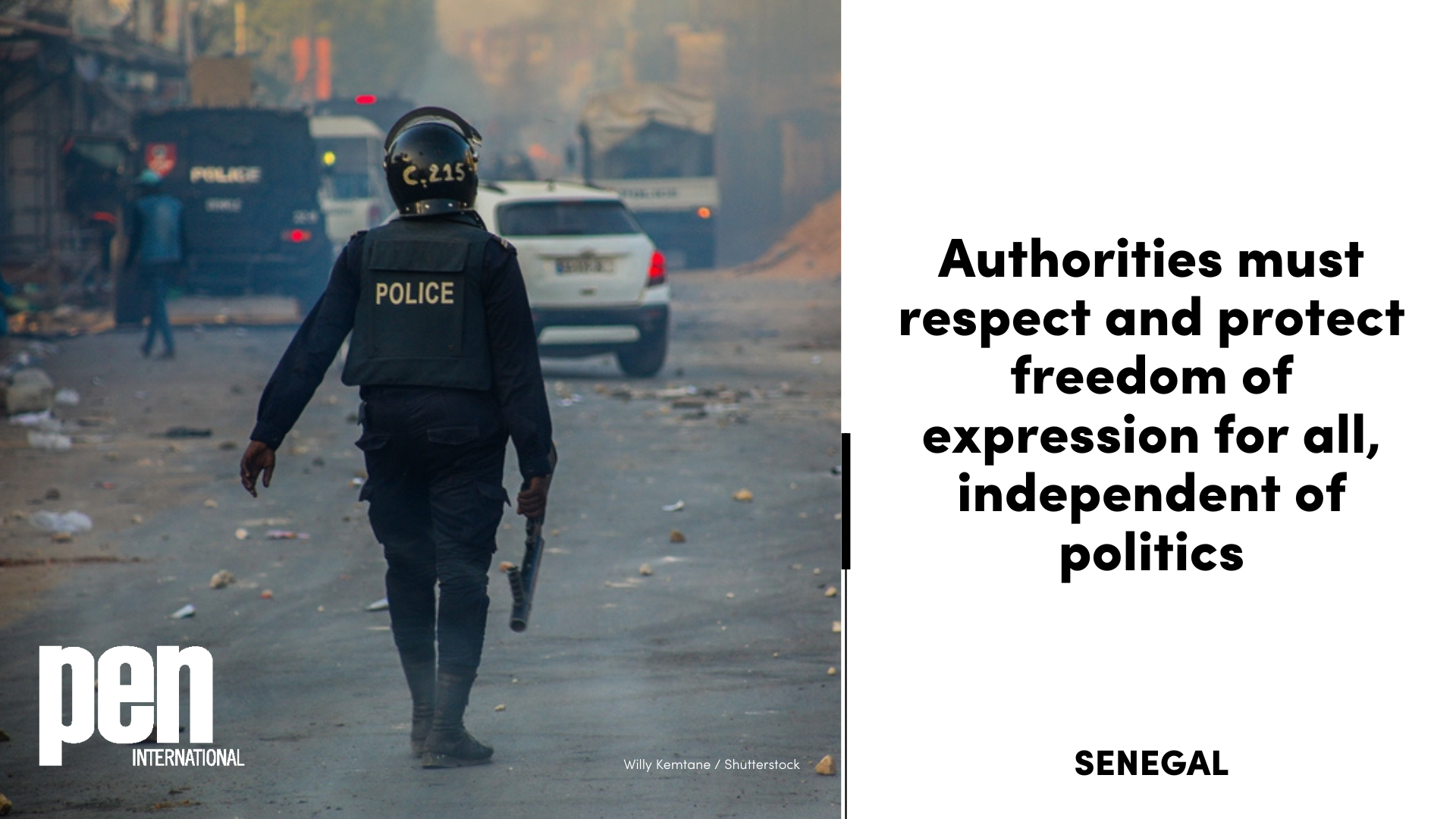Senegal: Authorities must respect and protect freedom of expression for all, independent of politics
Willy Kemtane / Shutterstock
22 February 2024: PEN International is gravely concerned about the mounting violations of freedom of expression and physical assaults to journalists in Senegal over recent weeks. The organisation strongly condemns the excessive use of force against peaceful protestors who took to the streets to object unlawful plans to postpone presidential elections, which resulted in killings, arbitrary arrests and detention of peaceful protestors; censorship of the independent press; suspension of internet services, and arbitrary bans on peaceful protests. Senegal, a country with such a long tradition of democracy, cannot afford to trample on human rights and dignity in such a manner.
PEN International calls on Senegalese authorities to uphold Senegal’s constitutional, regional, and international human rights obligations. As a state party to the International Covenant on Civil and Political Rights (ICCPR), and the African Charter on Human and People’s Rights (ACHPR), Senegal has a binding obligation to respect, promote, protect and fulfil the human rights of all people, including the rights to freedom of expression, access to information, and peaceful assembly under articles 19 and 21 of the ICCPR and articles 9 and 11 of the ACHPR. These obligations require Senegal to desist from attacks on the media and dissent, including through persecution of journalists, arbitrary cancellation of operating licenses, internet shutdowns and restrictions on telecommunications, and cracking down on civil society.
‘Suppressing the independent press, restricting the Internet, and repressing citizens legitimately exercising their rights to freedom of expression undermines the promises of the Constitution of Senegal. These are constitutionally guaranteed and protected human rights in Senegal. It is unfortunate that over the past few years, Senegalese authorities have incessantly toyed with the path of authoritarianism that has fast eroded Senegal’s acclaimed democratic example. Officials must avoid this direction before it is too late. No one should be persecuted for desiring and calling for respect and protection of their nation’s democratic governance,’ said Burhan Sonmez, President of PEN International.
While welcoming the ongoing release of protestors held in Senegalese prisons since the outbreak of protests that swept the country in March 2021, PEN International calls on Senegalese authorities to expedite all processes involved, and unconditionally release all those still in arbitrary detention for peacefully exercising their rights to freedom of expression, association, and assembly, and drop all charges against them. PEN International further calls on Senegalese authorities to institute an independent public inquiry to investigate incidents of security forces using lethal force against protestors since the onset of the country’s political crisis in 2021. Authorities must bring all those responsible to justice in fair trials and ensure victims and survivors of police brutality and their families have effective access to justice and adequate redress, including through material compensation and provision of medical and psychosocial support.
PEN International urges Senegal’s National Assembly to urgently review and amend laws on the use of firearms by security forces, in line with Senegal’s international obligations toward the rights to freedom of expression and peaceful assembly. The organisation encourages Senegal to include in its policing policies norms and principles enshrined in the African Union Guidelines for the Policing of Assemblies by Law Enforcement Officials in Africa; the International Human Rights Principles on the Protection of Human Rights in Protests; and UN Basic Principles on the Use of Force and Firearms by Law Enforcement Officials.
Finally, the African Union (AU), the Economic Community of West African States (ECOWAS) and the international community have a duty to hold Senegalese authorities accountable to the nation’s treaty obligations, and to step in to provide timely and comprehensive support to prevent similar escalations that led to the current crisis.
Background
On 3 February, Senegal President Macky Sall announced that presidential elections planned to take place on 25 February would be delayed indefinitely. This decree was followed by a chaotic parliamentary session on 6 February in which members of the National Assembly voted for a law to postpone Senegal’s presidential election from 25 February to 15 December 2024. Members of parliament opposing the law were forcibly removed by security forces in an apparent move to prevent them from voting. As a result, protests erupted in various cities across Senegal.
The security forces used excessive and, in some instances, lethal force against peaceful protesters. According to a Human Rights Watch statement, at least four people have died from live bullet injuries inflicted by security forces, while 60 have been injured, and at least 271 arrested during protests, among them several politicians and activists. In efforts to stifle dissent, free speech and access to information, Senegal has adopted a raft of repressive tactics, including assaults and detention of journalists reporting on protests, repeated license suspension of independent media outlet, Walf-TV in 2023 for one month and on 4 February 2024 before its reinstatement on 11 February, recurring internet shutdowns and restrictions on mobile communications, with the latest shutdown of mobile internet effected on 5 February.
On 15 February, Senegal’s Constitutional Council overturned the law passed by parliament to postpone presidential elections, nullifying the president’s decree to postpone the elections. The following day, President Macky Sall released a statement in which he promised to fully abide by the decision of the Constitutional Council and that he would carry out consultations for the presidential election to take place ‘as soon as possible. These positive developments have led to a relative de-escalation of political tensions in Senegal, with authorities reportedly releasing more than 160 opposition protestors on 19 February and a peaceful march calling for elections to be held expeditiously allowed to proceed on Saturday 17 February for the first time since the annulled presidential decree.
Over the last three years, Senegal has faced unprecedented political tensions, fueled by a turbulent pre-election period that started with President Macky Sall’s prolonged dalliance with ambition to contest elections for a third term, which Senegal’s constitution prohibits, and politically motivated judicial harassment of prominent dissidents. This is especially the case for presidential candidate Ousmane Sonko since 2021, leading to his conviction on 1 June 2023 for a spurious offence of ‘corruption of the youth’ after he was acquitted of allegations of rape and death threats. On 3 July 2023 president Macky Sall finally caved in to local and international pressure and announced that he would not be contesting for a third term, and Ousman Sonko’s conviction bars him from the 2024 presidential race.
Since the onset of Senegal’s political turbulence in 2021, more than sixty people have been reported killed and hundreds injured during protests as a result of use of excessive force by security forces, including live ammunition. By January 2024, almost 1500 opposition members and activists had been arrested, detained and charged with offences related to their participation in protests since 2021.
For further information, please contact Nduko o’Matigere, Head of Africa at PEN International, 167-169, Great Portland Street, London, W1W 5PF, UK – email [email protected]
Become a Friend of PEN today and help us continue our vital work in supporting writers around the world who are being silenced. Starting at just £5 a month.


